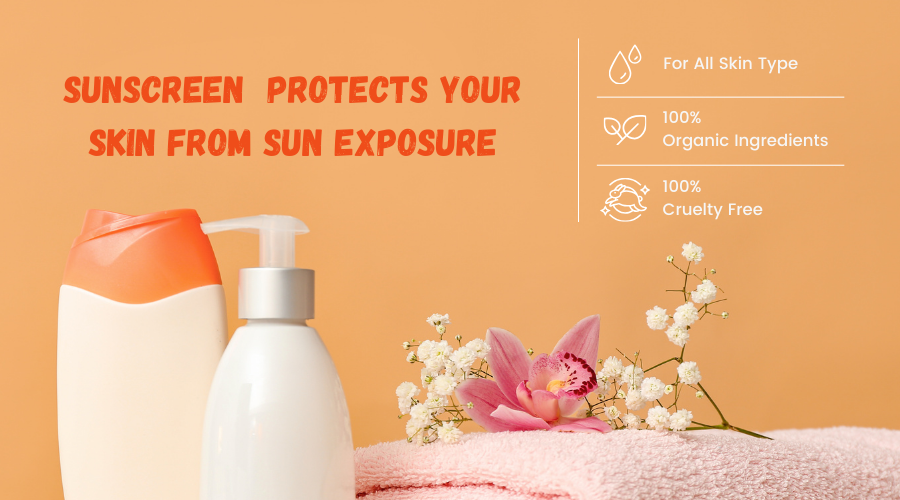
Taking care of your skin requires applying sunscreen, among the most significant steps you should take. From sunbathing, exercising, and even shopping for groceries, your skin never gets a break from sun damage. Unfortunately, many people either do not do it at all or not use sunscreen properly, thus causing unnecessary harm. Here, you will learn all the essentials of sunscreen that will assist you in making proper decisions for your skin.
Sunscreen is an appropriate product that is applied to the skin to guard against rays, especially those of the sun. UVA and UVB rays are both fatal and capable of triggering skin malignancies which leads to skin aging and skin cancer. A sunscreen layer on the skin creates a barrier by reducing or prohibiting all these dangerous rays from affecting your body.
SPF stands for Sun Protecting Factor, and it indicates the level by which skin is protected against UVB radiation, which causes skin burning.
SPF of 30, the sunscreen lets just 1/3 of the UVB rays through your skin.
SPF of 50, it lets even 1/5.
Indeed, it may not sound like a big difference, but over time, the consequences are between a woman with a fair complexion and one with sensitive skin or a man who spends most of his time under the sun.
There are two main varients of sunscreen: chemical and mineral. All work differently and are good, but they also have strengths and weaknesses.
• Chemical Sunscreens: These sunscreens physically block ultraviolet light since it hasn't penetrated the skin's surface. These stretch marks are primarily light and do not make one feel very comfortable with the skin, so they are thus mainly used regularly. However, people with sensitive skin are guaranteed to get skin rash owing to the chemical content used in the manufacture of the products.
• Mineral sunscreens: Also known as synthetic sunblock, these contain small natural minerals such as zinc oxide or titanium dioxide, which are applied to the outer layer of the skin to bounce back UV rays. Most of these are commonly used for those with sensitive skin, although they produce a white cast on darker skin tones.
In this case, the type of skin, physical activity, and preference can dictate the best sunscreen. Here's a quick guide:
• For Sensitive Skin: Choose sunscreen products that contain minerals. Zinc oxide and titanium dioxide, these ingredients ought to be less likely to produce skin reactions.
• For Oily or Acne-Prone Skin: Search for a non-greasy, non-acnegenic, and non-comedogenic product; they do not block pores on your skin.
• For Dry Skin: Select a sunscreen product that has extra moisturizing contents such as glycerine or hyaluronic acid for the skin to maintain moist skin.
• For Everyday Use: A lightweight formulation is ideal for everyday wear under makeup, preferably in a lotion or gel formulation.
• For Outdoor Activities: If you are going to swim or do any other activity that involves you getting wet or sweating, there are waterproof sunscreens with a long-standing effect.
You will be surprised to realize that sunscreen is considered one of the most powerful anti-aging skin care products available in the market. UVA rays are absorbed deep into the skin to destroy collagen, which is responsible for wrinkles, sagging, and dark spots. If you put on sunscreen daily, you will reduce the effects of aging, keeping your skin looking young.
Sunscreen is a vital element of pores and skin care and should be implemented during the year, now not only for the duration of the summer time. This article highlights a number of the errors humans make even as applying sunscreen and advises on a way to get it proper to protect and prolong younger-looking pores and skin.
Frequently Asked Questions (FAQs)
1. Why is skin protection so important?
Skin protection is essential because your skin acts as a barrier against pollutants, UV rays, and harmful microorganisms. Taking care of it helps prevent premature aging, sun damage, and various skin conditions like dryness or acne.
2. How can I protect my skin from the sun?
Use a broad-spectrum sunscreen with SPF 30 or higher every day, even when it’s cloudy. Reapply every two hours, wear protective clothing, and avoid direct sun exposure during peak hours (10 a.m. to 4 p.m.).
3. What is the best daily skincare routine for healthy skin?
A good skincare routine includes cleansing, toning, moisturizing, and applying sunscreen during the day. At night, focus on cleansing and moisturizing to allow your skin to repair itself while you sleep.
4. Do I need to wear sunscreen indoors?
Yes! UV rays can penetrate windows and even affect your skin through blue light from digital devices. Applying sunscreen indoors helps maintain your skin’s long-term health.
5. How can I protect my skin from pollution and environmental damage?
Cleanse your face thoroughly at the end of the day, use antioxidant-rich serums (like Vitamin C), and apply a good moisturizer to strengthen your skin’s barrier.
6. Can diet affect my skin’s health?
Absolutely. Eating a balanced diet rich in fruits, vegetables, and healthy fats helps keep your skin glowing. Avoid processed foods and excess sugar, as they can contribute to breakouts and dullness.
7. What are common signs that my skin is damaged?
Common signs include redness, dryness, flakiness, breakouts, or uneven texture. Long-term damage can also show up as wrinkles, pigmentation, or loss of elasticity.
Sunscreen now is a daily essential, not just for the beach bag skincare. The sunscreen market is growing ve...
READ FULLAn easy morning skincare routine is a protective measure for your skin all day. A good foundation for healt...
READ FULLAround one out of five people in the US are at risk of skin cancer because of a poor skincare routine. Espe...
READ FULL